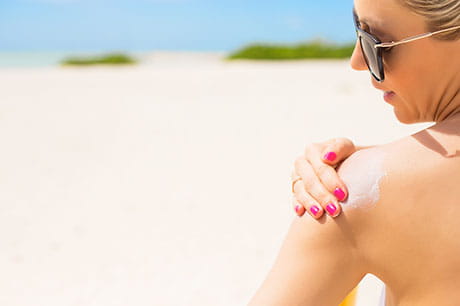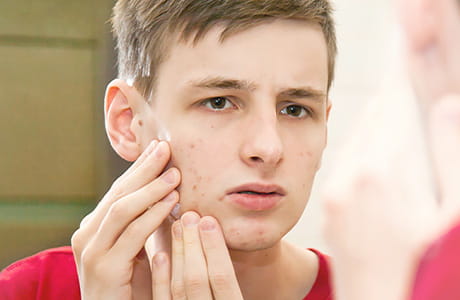5 summer skin survival tips
Avoid sunburn, dry skin and infections.
If you’re planning to go bare shoulders or bare legs this summer, you want to make sure your skin looks good, while also keeping it healthy. But sunrays, saltwater and chlorinated water can all have ill effects on your skin if you’re not sure how best to take care of it.
“If your skin is exposed to the elements at the pool, the beach or outside on a hike, make sure you take good care of it to prevent skin cancer, premature aging, rashes and dry skin,” says Geisinger dermatologist Christine Cabell, MD.
1. Apply and reapply sunscreen
Applying sunscreen regularly is one of the best ways to protect your skin from cancer and premature aging, short of covering your skin completely.
The American Academy of Dermatology recommends using waterproof sunscreens with a sun protection factor (SPF) of 30 or higher. Look for broad-spectrum coverage that protects from both UVA and UVB rays.
Fifteen minutes before going outside, apply at least an ounce of sunscreen to all bare skin, including often-forgotten places like the tops of your ears, your neck and your feet. Then, reapply every two hours, or after you get out of the water.
2. Moisturize
Though the air is less dry during summer months than during the fall and winter, you should still moisturize your skin to prevent dry, scaly skin that is more prone to cracking. Apply a light moisturizer each day and after showering or bathing to lock in the moisture in your skin.
“Even though there’s more humidity in the air, being out in the sun, taking long, hot showers and using bar soaps are the perfect combination for drying out your skin and leaving it feeling itchy and not looking its best,” says Dr. Cabell.
You should also apply lip balm with an SPF to protect the skin on your lips, which can easily become chapped and cracked when you spend time outside.
3. Drink plenty of water
Staying hydrated all summer can be more difficult if you’re exercising, working or playing outside. Drinking at least eight glasses of water each day can help your skin to look and feel healthy all summer.
Of course, drinking plenty of water will also keep you from getting dehydrated, which can lead to a headache, dizziness, muscle cramps, fatigue and dry mouth.
4. Wear sunglasses or a hat
Provide extra protection for your face and eyes by wearing sunglasses or a brimmed hat (or both!). Sunglasses will keep you from squinting, which can contribute to crow’s feet wrinkles around your eyes.
“Eye protection can also help protect your eyes from prolonged sun exposure, which can contribute to cataracts, cancer and eye growths,” says Dr. Cabell. “Look for glasses with UV protection or sport a broad-brimmed hat.”
5. Change out of wet bathing suits and workout gear
Here’s something you don’t often associate with swimming: Jock itch. Yes, it can happen, and it’s likely not going to be pleasant.
Jock itch is a fungal skin infection that grows in cool, moist and dark places like your groin, inner thigh or buttocks. If you’re wearing a wet bathing suit or sweaty workout gear for a long time, fungus could start to grow.
“Walking around in a wet bathing suit can cause rashes like jock itch or, for people with especially sensitive skin, irritation and redness,” says Dr. Cabell. “You should always dry completely and, if you’re not headed back into the water, you should change into dry clothes.”
Next steps:
Learn about dermatology care at Geisinger
Here's how to treat a sunburn





